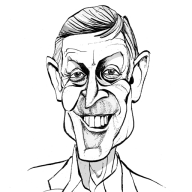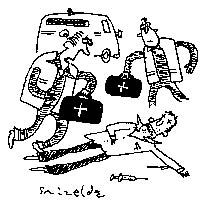Two small professional duties, and as much pleasures as duties, have recently overlapped in an unexpected way. I’ve read a colleague’s book on genetics; and I’ve recorded a BBC programme on the psychoanalyst C.G. Jung. I know of no evidence that Jung took a close interest in genetics; and I imagine a typical modern geneticist would regard Carl Jung’s work as mystical mumbo-jumbo and a branch more of literature than of science; but in the overlap there may be something of interest to both disciplines.
Jung was the choice of my guest Ruby Wax for a programme we were recording for future broadcast in my BBC Radio 4 Great Lives series. The writer, broadcaster, interviewer and comedienne has lurched, mid-life, into a serious interest in the study of psychotherapy, and Jung was her choice of a great life.
Ruby is one of those deeply serious people who just cannot help distracting her audience and herself by her talent to amuse, and I must allow her to speak for herself (our transmission date is Tuesday 28 April); but I think it’s fair to say that central to what has drawn her to Jung’s work was Freud’s great disciple’s fascination with the individual’s reconciling himself to — meshing himself harmoniously with — the underlying human being that he is but may not know much about.
Jung, who called this process ‘individuation’, coined the term ‘collective unconscious’, but its popular use, to mean the things that everybody in a group knows without necessarily being conscious of knowing, rather distorts what he meant. He meant that all human beings, and all cultures, think and feel in certain shared ways and through certain universal channels, just by virtue of being human animals. It is as though our lives, though lived individually and variously, are all heavenly bodies in a common cosmos where forces seen and unseen, gravitational fields, black holes and dark stars exert their push and pull on everybody. As a planet’s trajectory cannot be understood except by reference to the sun around which it is orbiting, so we cannot understand ourselves until we understand the collective unconscious we share as humans, and with which our individual life is a constant interaction.
Jung’s means of access to this collective unconscious included, famously, the study of dreams. In these very different ages, language groups and cultures could recognise common (or equivalent) symbols — the mother, etc: fears, yearnings, anxieties, bossinesses and subordinations. These do not predetermine what a person will become — capacities, talents and experiences differ — but influence it heavily.
Jung fell out bitterly with Freud, who disliked the mysticism and resented Jung’s rejection of the sex drive as the primary and overriding explanation of all human behaviour. Freud was inclined to analyse an individual overwhelmingly through the exploration of what had happened to him since birth; Jung, by contrast, wanted to explore what happens to all of us before (as it were) birth: the psyche we inherit from the human race.
Our Great Lives discussion rather took us over and seriously overran the programme’s allotted half-hour, so how my poor producer will have been able to tighten the draw-strings I cannot think; but I left the studio, head buzzing with these (to me) unfamiliar ideas.
Not long after, my copy of Fifty Genetics Ideas you really need to know arrived from Amazon. Its author, Mark Henderson, is science editor of the Times and a colleague whose writing I’ve always found absorbing, and ever since arguing fiercely (and unsuccessfully) for the geneticist Steven Pinker’s The Blank Slate to win a popular science books competition when I was one of the judges, I’ve been fascinated by developments in modern genetics. We are plainly not, in Pinker’s phrase, blank slates, and I share with him the suspicion that the social sciences and educationists’ theories have tended to lag several decades behind modern genetics, particularly since the discovery of DNA. In our politics and administration there remains something of a philosophical overhang from the 1960s, when the intellectual fashion was to regard every child as possessing similar potentials and aptitudes at birth — everything therefore depending on the ‘input’ the developing child receives from parents, society and the state.
Henderson’s excellent book guides the layman through these ideas and discoveries with lucidity and verve. And, as I read it, Ruby and Jung still fresh in my mind, I began to wonder whether C.G. Jung, in the dark and of course with no foreknowledge of modern genetics, was straining after some of the same truths as (post-DNA and post-Dawkins) our age has come to understand as truths about genetics. Ever since Mendel the science of genetics has focused on the causes and mechanisms of variation; whereas Jung’s focus is on what is held in common. But central to both, I suggest, is a study of the hard-wiring of the human brain, and therefore of human behaviour.
Jung had only observation and hunch to work with. His observation, along with his study of dreams, was that his patients seemed to share a certain standard psychological topography. The uphill battles, the downhill slides, the very idea (more ancient than Jung) of going with or against the grain of human nature, all pointed to an architecture of the mind predetermined before birth, and shared across mankind. In some ways the battle between him and Freud has resonances with the battle between those who place childhood influences centre-stage of any account of why we become the adults that we are, and those who (while never denying the importance of environmental influences) consider the raw material with which we start to be of immense importance. I have tried to avoid the overuse of the expression ‘hard-wired’ but it is apt. Jung was fascinated by the hard-wiring but, having no other realm to posit, posited a somewhat mystical mental realm, the common terrain of humanity, stalked by symbols and dreams.
Spectator readers will be acutely, perhaps rather disapprovingly, aware that your columnist is an expert in neither modern genetics nor Jungian psychology; but, though interdisciplinary studies have recently become quite fashionable, I do wonder whether the kind of scientist who is interested in genetics is likely to be disposed to any great interest in an early-to-mid-20th-century Swiss psychotherapist or his essay Symbols and the Interpretation of Dreams; or whether the (at times rather hippyfied) ‘alternative’ thinkers and writers who have been fascinated by Jung, their work carrying still the faint scent of joss-sticks, are likely to want to read Fifty Genetics Ideas you really need to know. Yet both may be feeling for a related truth.






Comments